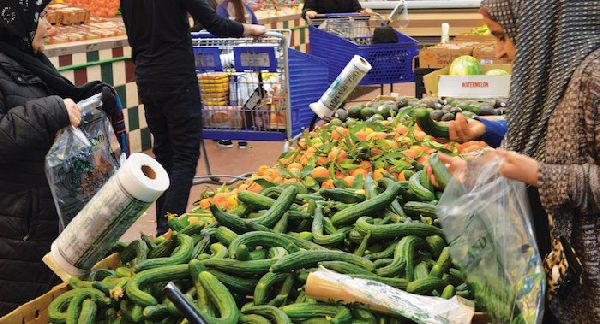
|
| Fresh vegetables at Greenland Market on Miller. |
DEARBORN — The city’s markets and grocery stores are unique in the region, if not the nation.
Lined with signs adorned in Arabic, streets like Warren Avenue offer an assortment of Middle Eastern shops that captivate taste buds from near and far. Goods, spices and sweets found mainly in the homeland keep customers coming back for more, supporting a unique market dedicated to the Arab American.
But as Arabs continue being essential threads of the community’s fabric— and as more people embrace the Mediterranean flavor— these local stores cease to be the only ones that carry the pita bread, chickpeas and other Arab household requirements.
Major supermarket chains, like Walmart, Meijer, Kroger and Whole Foods, are increasingly recognizing the presence of an Arab American market, stocking Middle Eastern staples once only sought by immigrants at modest stores.
Fay Beydoun, executive director of the American Arab Chamber of Commerce, said Arab Americans have developed an affluent business community, creating a substantial and expanding market that larger chains are recognizing and catering to.
Halal meat is now sold at the local Costco, for example. A local chef’s falafels are also being sold at local Whole Foods and Meijer stores, according to Beydoun.
Mostly, residents enjoy the convenience of shopping for Arabic products at large chains while they shop for all their other groceries.
Zeinab, a Dearborn Heights resident and Walmart shopper who did not wish to disclose her last name, said she prefers to shop at Walmart because of the cheap prices and proximity to her home.
When Zeinab buys necessities for her family, she said she always finds herself in the international foods aisle, the majority of which is taken up by the Middle Eastern section.

|
| A Shopper buying halal meat. |
“Here, I get everything I want at once,” Zeinab said as she grabbed foods like hummus, pita bread and Arabic coffee.
However, some groceries she buys only at the local Arabic grocery stores – produce.
Most Arab and Muslim Americans buy their vegetables, fruits and meats from grocers who offer a wider and more specific variety of products not available at most larger chains, like halal meat and kusa, a vegetable similar to zucchini and squash.
Haidar Koussan, co-owner of Greenland Market, one of the largest Middle Eastern grocery chains in the county, said Dearborn’s produce is famous state-wide for being cheap, diverse and plentiful.
Koussan said stores like his carry merchandise others never will, like spices, mixed nuts and kafta.
Arab Americans are not the only ones who take advantage of such availability. Naci Yilmaz, a Turkish Plymouth resident, said he frequently shops at Dearborn’s Arabic stores because produce there is cheaper and fresher than at either Walmart or Meijer.
He added that Middle Eastern grocers carry a multitude of assorted foods more suitable for Turkish cuisine.
As prominent as billion dollar corporations like Walmart can be, some Middle Eastern grocery shop owners say they don’t fear competition from the large chains. Originality, combined with low prices and acclaimed sales, position stores like Greenland ahead of major stores among local Arabs and non-Arabs alike, Koussan said.
“We’re a family owned business,” he explained. “We can afford to drop prices; we can afford to do any price we want that a major store cannot do. Their overhead cost is way more.”
Ali Mehdi, a butcher at Al-Houda Supermarket on Warren Avenue, said supermarket chains cannot compete with smaller grocers because they attract a different market.
Arabs also prefer to buy from and support each other, he added.
Mohammad Tarraf, Mehdi’s co-worker, said he encounters customers on a daily basis who have traveled from places like Ohio and Canada just to shop for groceries like meat, olive oil, coffee and rice in large quantities.
However, some local Arabic grocery stores struggle to make ends meet. A co-owner of a shop on Ford Road, who wished to remain anonymous, said although many dedicated customers have opted to shop at her store for 12 years, the grocer frequently loses money.
She said that when large chains buy products in large quantities, they receive a greater return in profits. At many smaller stores, goods are bought in smaller amounts and are sold to the customer for the same or cheaper price than they are purchased, meaning the small store doesn’t make a profit.
Convenient and cheap or not, some Arabs say they have no reason to shop at a major grocery store chain.
Ianiah Hussein, an Iraqi shopper and mother, said she would “never” go a Walmart or Meijer for food.
She added in Arabic that the Arabic cuisine is well known for its special ingredients not found in non-Middle Eastern shops.
“Arabic stores know what the Arabic mother needs, what her cooking is like and the role that a meal plays in a household,” Hussein said.
“Even if I had to travel a long distance, I prefer to go somewhere where I can get everything I need.”






Leave a Reply